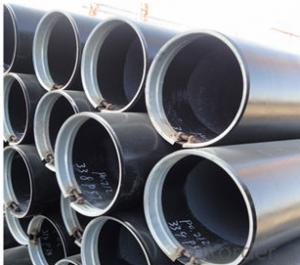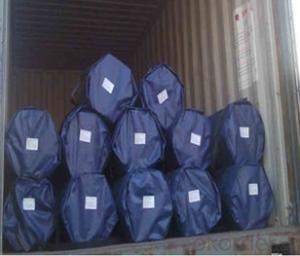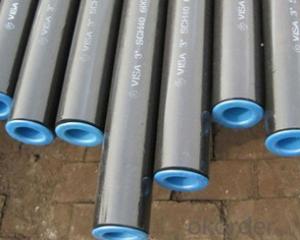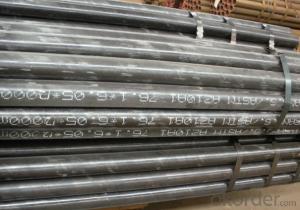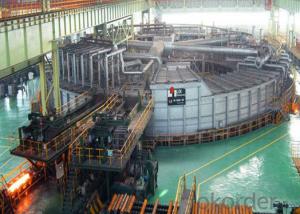High-quality Carbon Seamless Steel Pipe For Boiler Q345 CNBM
- Loading Port:
- Qingdao
- Payment Terms:
- TT OR LC
- Min Order Qty:
- 10 pc
- Supply Capability:
- 30 pc/month
OKorder Service Pledge
OKorder Financial Service
You Might Also Like
Quick Details
| Thickness: | 3 - 60 mm | Section Shape: | Round | Outer Diameter: | 21.3 - 1220 mm |
| Secondary Or Not: | Non-secondary | Application: | fluid pipe,boiler pipe, structural pipe, oil/gas/water pipe etc | ||
| Technique: | Hot Rolled | Certification: | ISO9001-2000, ISO14000, ISO18000 , API 5L | Surface Treatment: | Painted, Oiled, galvanized or phosphate etc |
| Special Pipe: | API Pipe | Alloy Or Not: | Is Alloy | Technique:: | Hot rolled or cold rolled |
| Special pipe:: | API/ ASME/thickwall/oil/gas/water pipe | Length:: | 3-12m | Treatment of two ends:: | Beveled end , plain end etc |
| Brand:: | Bai Chuan | Third Party Inspection:: | BV, SGS etc. | Schedule:: | SCH10-SCH160, XS, XXS |
| Other Material:: | 10#, 20#, 16Mn, Q345 etc | Material Type:: | Carbon steel/ Low alloy steel | Producing standard:: | American/Japanese/ German/ Britain/ Chinese standard |
| Grade: | A53(A,B),A106(B,C),A210,API J55,St37,STPG42,A53-A369,API J55-API P110,ST35-ST52 | Standard: | BS EN10296,JIS G3452-2004 |
1. Out Diameter: | 21.3mm-1220mm |
2. Wall Thickness: | 3mm-60mm |
3. Length: | 3m-12m |
4. Producing Standard: |
|
5. Main Material: (Carbon Steel & Low Alloy steel) |
|
6. Special specifications: | Available according to customer’s requirements and quantity. |
7. End Shape: | Beveled end , plain end, varnished, or adding plastic caps to protect the two ends as per customer’s requirements. |
8. Surface treatment: | Painted, Oiled, galvanized, phosphate etc. |
9. Usage: |
|
10. Certificates: | ISO9001-2000, ISO14000, ISO18000, API 5L certificate |
11. Third party inspection: | Welcome you to send a third party inspecting company (BV, SGS etc) to check the quality of our final products. |
12. Pictures: | our producing flow chart, our factory, production line, inspecting equipments, our products are listed below for your reference. |
- Q:What are the advantages of using steel pipes in construction?
- There are several advantages of using steel pipes in construction. Firstly, steel pipes are incredibly strong and durable, making them suitable for carrying heavy loads and withstanding extreme weather conditions. Secondly, steel pipes have a high resistance to corrosion, which ensures their longevity and minimizes maintenance costs. Additionally, steel pipes are versatile and can be easily customized to fit specific project requirements. Lastly, steel pipes are fire-resistant, making them a safer choice for construction purposes. Overall, the use of steel pipes in construction offers strength, durability, corrosion resistance, versatility, and fire safety.
- Q:How are steel pipes used in the manufacturing of automobiles?
- Steel pipes are commonly used in the manufacturing of automobiles due to their strength, durability, and versatility. They are used in various applications throughout the automobile manufacturing process. One of the main uses of steel pipes in automobiles is for the construction of the vehicle's chassis and body. Steel pipes are often used as structural components to provide strength and rigidity to the vehicle. They can be bent, shaped, and welded to form the desired structure, making them an ideal choice for automotive applications. Steel pipes are also used in the exhaust system of automobiles. The exhaust system is responsible for guiding and directing the exhaust gases away from the engine. Steel pipes are used to create the exhaust manifold, which collects the gases from the engine's cylinders, as well as the exhaust pipes and mufflers. The high temperature resistance and corrosion resistance of steel make it suitable for withstanding the harsh conditions of the exhaust system. In addition, steel pipes are used in the cooling system of automobiles. They are used to transport coolant from the engine to the radiator and back, helping to regulate the engine's temperature. Steel pipes are preferred for this application due to their ability to handle high pressure and temperature, as well as their resistance to corrosion and chemical damage. Moreover, steel pipes are used in the fuel system of automobiles. They are used to transport fuel from the tank to the engine, ensuring a steady and reliable supply of fuel. Steel pipes are chosen for this application because they are resistant to corrosion and can handle the high pressure and temperature associated with fuel transportation. In summary, steel pipes are essential in the manufacturing of automobiles. They are used in the construction of the chassis and body, the exhaust system, the cooling system, and the fuel system. Their strength, durability, and versatility make them a preferred choice for automotive applications.
- Q:What are the different types of steel pipes?
- There are several different types of steel pipes, including carbon steel pipes, stainless steel pipes, alloy steel pipes, and galvanized steel pipes. Carbon steel pipes are the most common type and are used for a wide range of applications. Stainless steel pipes are corrosion-resistant and often used in industries where hygiene is important. Alloy steel pipes are made from a combination of different metals to enhance their strength and durability. Galvanized steel pipes are coated with a layer of zinc to prevent corrosion and are commonly used in outdoor and marine applications.
- Q:What are the environmental benefits of using steel pipes?
- There are several environmental benefits of using steel pipes: 1. Durability: Steel pipes have a long lifespan, which reduces the need for frequent replacements. This helps to conserve resources and reduces the amount of waste generated. 2. Recyclability: Steel is one of the most recycled materials in the world. When steel pipes reach the end of their life, they can be easily recycled and used to manufacture new steel products. This reduces the demand for raw materials and saves energy that would otherwise be required for the production of new materials. 3. Reduced carbon emissions: Steel pipes have a low carbon footprint compared to other materials like concrete or plastic. The manufacturing process for steel pipes produces fewer greenhouse gas emissions, contributing to a lower carbon footprint overall. 4. Resistance to corrosion: Steel pipes have high resistance to corrosion, which means they require less maintenance and repair compared to other materials. This reduces the use of chemical coatings and treatments that can have negative environmental impacts. 5. Water conservation: Steel pipes are commonly used for water supply and distribution systems. They have smooth interiors that minimize friction, reducing the amount of energy required to pump water through the pipes. This helps to conserve energy and decrease the carbon emissions associated with water transportation. 6. Fire resistance: Steel pipes are inherently fire-resistant, which makes them a safer choice for many applications. In the event of a fire, steel pipes can help to contain the spread of flames and minimize damage to the environment. Overall, the use of steel pipes offers numerous environmental benefits such as durability, recyclability, reduced carbon emissions, water conservation, and fire resistance. These factors make steel pipes a sustainable choice for various infrastructure projects.
- Q:Can steel pipes be used for the construction of railway tracks?
- No, steel pipes are not suitable for the construction of railway tracks. Railway tracks require specialized rails made of steel that are specifically designed to withstand the heavy loads and constant wear and tear associated with train traffic. Pipes do not have the necessary shape, strength, or durability to serve as railway tracks.
- Q:How are steel pipes used in the construction of stadiums?
- Steel pipes are used in the construction of stadiums for various purposes such as structural support, plumbing, and drainage systems. They are commonly used to create the framework and support structures for the stadium's roof, stands, and other architectural elements. Additionally, steel pipes are also utilized in the installation of plumbing systems for supplying water and gas, as well as for drainage systems to manage wastewater and rainwater. Overall, steel pipes play a crucial role in providing strength, durability, and functionality to stadiums during their construction.
- Q:Can steel pipes be used for underground fuel storage systems?
- Steel pipes are an excellent choice for underground fuel storage systems. Due to their strength, durability, and resistance to corrosion, they are widely used in this application. By opting for steel pipes, one can rely on a secure and long-lasting solution for underground fuel storage. These pipes are capable of withstanding the pressure and weight of the fuel, making them suitable for this purpose. Moreover, their easy weldability and interconnectivity provide flexibility in designing and constructing such systems. However, it is crucial to ensure that the steel pipes used in underground fuel storage systems are properly coated or lined to prevent corrosion and protect the fuel from contamination. Regular inspections and maintenance play a vital role in identifying and addressing any potential issues that may arise.
- Q:What are the different methods of pipe cutting for steel pipes?
- There are several methods of pipe cutting for steel pipes, each suited for different situations and requirements. Some of the most common methods include: 1. Manual Pipe Cutters: These handheld tools are commonly used for cutting smaller diameter steel pipes. They typically feature a cutting wheel that is rotated around the pipe, gradually creating a groove until the pipe is cut through. Manual pipe cutters are portable and relatively easy to use, making them suitable for on-site cutting tasks. 2. Hacksaw: Using a hacksaw is a traditional and cost-effective method for cutting steel pipes. This method requires physical effort and time, but it can be effective for cutting pipes with smaller diameters. It is important to use a fine-toothed blade and apply steady pressure to ensure a clean and precise cut. 3. Reciprocating Saw: Also known as a sawzall, a reciprocating saw is a power tool that uses a back-and-forth cutting motion to quickly and efficiently cut through steel pipes. These saws are versatile and can be used with different types of blades to handle different pipe sizes and thicknesses. 4. Band Saw: Band saws are commonly used in industrial settings for cutting large steel pipes. These saws feature a continuous loop of teethed metal blade that runs on wheels, allowing for precise and rapid cutting. Band saws are ideal for cutting large-diameter pipes and can be manually operated or fully automated for high-volume cutting tasks. 5. Pipe Cutting Machines: To achieve accurate and consistent cuts, pipe cutting machines are often used. These machines are designed to cut steel pipes with speed and precision, making them ideal for large-scale industrial applications. Depending on the specific machine and requirements, different cutting methods such as abrasive cutting, flame cutting, or plasma cutting can be employed. It is important to note that the choice of pipe cutting method depends on factors such as pipe diameter, thickness, location, precision requirements, and available resources. Proper safety precautions should always be followed when working with any cutting method to avoid injury or damage to the pipes.
- Q:Where is a steel pipe casing usually used?
- A straight tube of carbon steel sheathed on pipes and tubes and threading tubes to protect the joints from damage by electric welding. The purpose is to protect the wires and cables.
- Q:What is the difference between carbon steel pipes and stainless steel pipes?
- The main difference between carbon steel pipes and stainless steel pipes lies in their composition. Carbon steel pipes are primarily made of iron and carbon, while stainless steel pipes contain iron, carbon, and a minimum of 10.5% chromium. This high chromium content in stainless steel pipes provides excellent corrosion resistance, making them suitable for various applications in industries like food processing, chemical, and oil & gas. On the other hand, carbon steel pipes are more cost-effective and have higher strength than stainless steel pipes, but they are more susceptible to corrosion and thus require regular maintenance and coating for protection.
1. Manufacturer Overview |
|
|---|---|
| Location | |
| Year Established | |
| Annual Output Value | |
| Main Markets | |
| Company Certifications | |
2. Manufacturer Certificates |
|
|---|---|
| a) Certification Name | |
| Range | |
| Reference | |
| Validity Period | |
3. Manufacturer Capability |
|
|---|---|
| a)Trade Capacity | |
| Nearest Port | |
| Export Percentage | |
| No.of Employees in Trade Department | |
| Language Spoken: | |
| b)Factory Information | |
| Factory Size: | |
| No. of Production Lines | |
| Contract Manufacturing | |
| Product Price Range | |
Send your message to us
High-quality Carbon Seamless Steel Pipe For Boiler Q345 CNBM
- Loading Port:
- Qingdao
- Payment Terms:
- TT OR LC
- Min Order Qty:
- 10 pc
- Supply Capability:
- 30 pc/month
OKorder Service Pledge
OKorder Financial Service
Similar products
New products
Hot products
Related keywords
